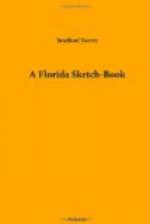Walking naturalists and lovers of things natural have their own point of view, individual, unconventional, whimsical, if you please,—very different, at all events, from that of clearer-witted and more serious-minded men; and the inhabitants of Sanford will doubtless take it as a compliment, and be amused rather than annoyed, when I confess that I found their city a discouragement, a widespread desolation of houses and shops. If there is a pleasant country road leading out of it in any direction, I was unlucky enough to miss it. My melancholy condition was hit off before my eyes in a parable, as it were, by a crowd of young fellows, black and white, whom I found one afternoon in a sand-lot just outside the city, engaged in what was intended for a game of baseball. They were doing their best,—certainly they made noise enough; but circumstances were against them. When the ball came to the ground, from no matter what height or with what impetus, it fell dead in the sand; if it had been made of solid rubber, it could not have rebounded. “Base-running” was little better than base-walking. “Sliding” was safe, but, by the same token, impossible. Worse yet, at every “foul strike” or “wild throw” the ball was lost, and the barefooted fielders had to pick their way painfully about in the outlying saw-palmetto scrub till they found it. I had never seen our “national game” played under conditions so untoward. None but true patriots would have the heart to try it, I thought, and I meditated writing to Washington, where the quadrennial purification of the civil service was just then in progress,—under a new broom,—to secure, if possible, a few bits of recognition ("plums” is the technical term, I believe) for men so deserving. The first baseman certainly, who had oftenest to wade into the scrub, should have received a consulate, at the very least. Yet they were a merry crew, those national gamesters. Their patriotism was of the noblest type,—the unconscious. They had no thought of being heroes, nor dreamed of bounties or pensions. They quarreled with the umpire, of course, but not with Fate; and I hope I profited by their example. My errand in Sanford was to see something of the river in its narrower and better part; and having done that, I did not regret what otherwise might have seemed a profitless week.
First, however, I walked about the city. Here, as already at St. Augustine, and afterward at Tallahassee, I found the mocking-birds in free song. They are birds of the town. And the same is true of the loggerhead shrikes, a pair of which had built a nest in a small water-oak at the edge of the sidewalk, on a street corner, just beyond the reach of passers-by. In the roadside trees—all freshly planted, like the city—were myrtle warblers, prairie warblers, and blue yellowbacks, the two latter in song. Once, after a shower, I watched a myrtle bird bathing on a branch among the wet leaves. The street gutters were running with sulphur water,




